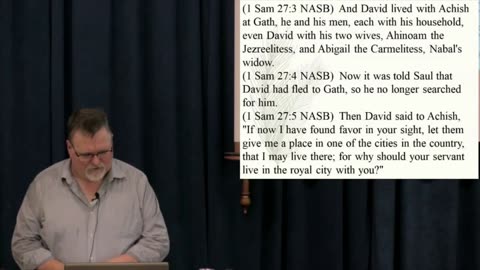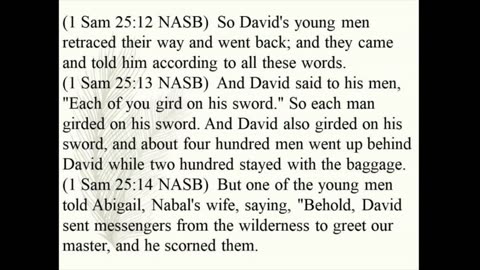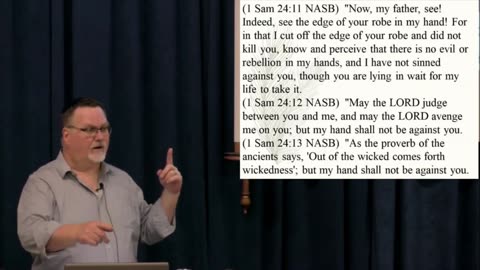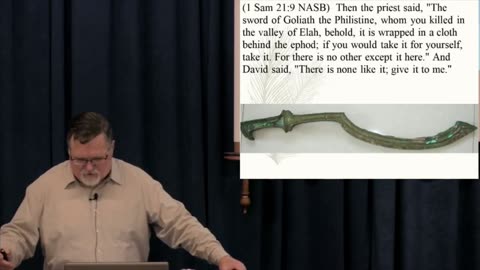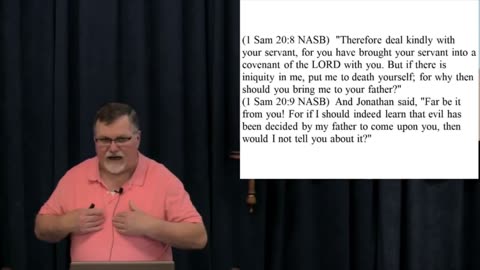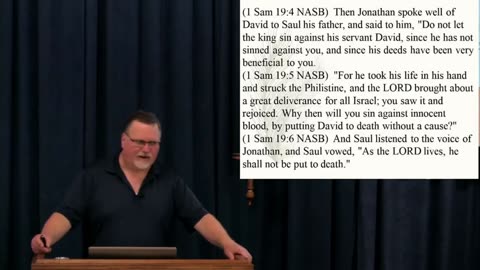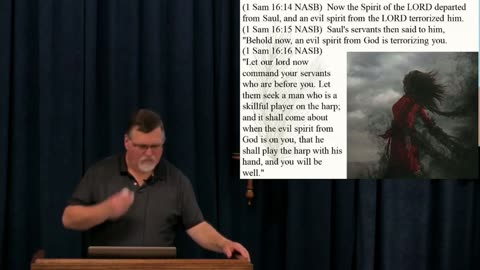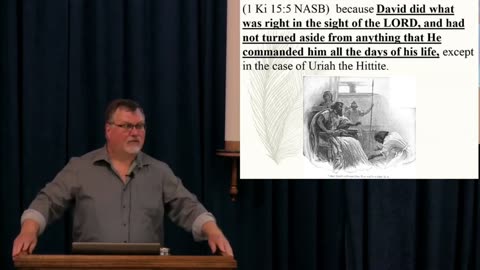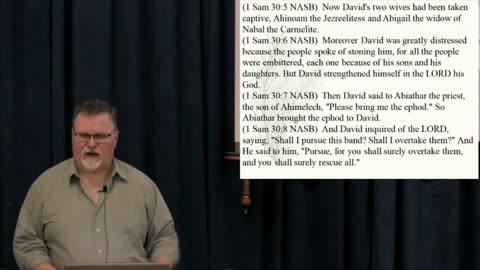
1 Samuel
14 videos
Updated 7 months ago
1 Samuel
The two Books of Samuel were originally one volume in the Hebrew text. Upon its translation into Greek (the Septuagint), Samuel was joined with the Book of Kings, and the total work was called "The Books of the Kingdoms." In order to keep the work from becoming too voluminous, it was divided at that time into the four divisions now found in the English text. The first two divisions bear the name of the prominent character Samuel -- prophet, priest, and anointer of kings.
The author of the books of 1 and 2 Samuel is unknown and anonymous. Jewish tradition claims that the prophet Samuel wrote the Books of Judges and Samuel, while the prophets Gad and Nathan supplied supplementary information concerning the years following Samuel's death. Nevertheless, there is no reference to an author in the book. The biblical text does indicate that prophetic figures (Samuel, Nathan, and Gad) chronicled many of the acts of King David.
1 Chr. 29:29 These are their genealogies: the first-born of Ishmael was Nebaioth, then Kedar, Adbeel, Mibsam,
The dating of the book is approximately 1120-1010 B.C. First Samuel deals with the period of time between the birth of Samuel and the closing days of Saul's reign. It begins in a setting of a loose, tribal organization with little or no leadership and concludes with the death of the deranged King Saul, who ends his own life in the heat of battle with the Philistines. This book covers more than a century of Hebrew history. The theme of the book is the beginning of the Israelite Monarchy: The book describes the growing desire for a king, the differing opinions that accompanied that desire, and the roles that various individuals played in the beginning and continuing days of Hebrew kingship. The materials depict kingship as a theological rather than a political matter. The Elohim of Israel continues to be the true King of Israel. The earthly king would represent the nation before Elohim and would be ultimately responsible to Him. The book clearly reveals that the success or failure of the anointed king would be determined by his obedience or disobedience to Torah and his commitment to the will of Elohim. For God, the king was to be a Spirit-led national leader who adhered to the Torha of Elohim and recognized the Elohim as the true King of the nation. It was this concept of kingship that Elohim ordained.
-
1 Samuel 28 – 31 – Saul inquired of Elohim, but He would not answer him. Why not?
 RVTA1 Sam 28:6 When Saul inquired of the LORD, the LORD did not answer him, either by dreams or by Urim or by prophets. Out of fear of the Philistines, Saul inquired of Elohim. But due to the disobedience of Saul, Elohim would not answer him. We are told many times in Scripture that if we are not obedient to the Torah of Elohim, He will not answer, or even hear, our prayers. Prov. 1:22-2:6 The proverbs of Solomon the son of David, king of Israel: 2To know wisdom and instruction, To discern the sayings of understanding, 3To receive instruction in wise behavior, Righteousness, justice and equity; 4To give prudence to the naive, To the youth knowledge and discretion, 5A wise man will hear and increase in learning, And a man of understanding will acquire wise counsel, 6To understand a proverb and a figure, The words of the wise and their riddles. 7The fear of the LORD is the beginning of knowledge; Fools despise wisdom and instruction. 8Hear, my son, your father’s instruction, And do not forsake your mother’s teaching; 9Indeed, they are a graceful wreath to your head, And ornaments about your neck. 10My son, if sinners entice you, Do not consent. 11If they say, “Come with us, Let us lie in wait for blood, Let us ambush the innocent without cause; 12Let us swallow them alive like Sheol, Even whole, as those who go down to the pit; 13We shall find all kinds of precious wealth, We shall fill our houses with spoil; 14Throw in your lot with us, We shall all have one purse,” 15My son, do not walk in the way with them. Keep your feet from their path, 16For their feet run to evil, And they hasten to shed blood. 17Indeed, it is useless to spread the net In the eyes of any bird; 18But they lie in wait for their own blood; They ambush their own lives. 19So are the ways of everyone who gains by violence; It takes away the life of its possessors. 20Wisdom shouts in the street, She lifts her voice in the square; 21At the head of the noisy streets she cries out; At the entrance of the gates in the city, she utters her sayings: 22“How long, O naive ones, will you love simplicity? And scoffers delight themselves in scoffing, And fools hate knowledge? 23“Turn to my reproof, Behold, I will pour out my spirit on you; I will make my words known to you. 24“Because I called, and you refused; I stretched out my hand, and no one paid attention; 25And you neglected all my counsel, And did not want my reproof; 26I will even laugh at your calamity; I will mock when your dread comes, 27When your dread comes like a storm, And your calamity comes on like a whirlwind, When distress and anguish come on you. 28“Then they will call on me, but I will not answer; They will seek me diligently, but they shall not find me, 29Because they hated knowledge, And did not choose the fear of the LORD. 30“They would not accept my counsel, They spurned all my reproof. 31“So they shall eat of the fruit of their own way, And be satiated with their own devices. 32“For the waywardness of the naive shall kill them, And the complacency of fools shall destroy them. 33“But he who listens to me shall live securely, And shall be at ease from the dread of evil.” 2 My son, if you will receive my sayings, And treasure my commandments within you, 2Make your ear attentive to wisdom, Incline your heart to understanding; 3For if you cry for discernment, Lift your voice for understanding; 4If you seek her as silver, And search for her as for hidden treasures; 5Then you will discern the fear of the LORD, And discover the knowledge of God. 6For the LORD gives wisdom; From His mouth come knowledge and understanding. Prov 28:9 He who turns away his ear from listening to the law, Even his prayer is an abomination. Zech. 7:12-13 And they made their hearts like flint so that they could not hear the law and the words which the LORD of hosts had sent by His Spirit through the former prophets; therefore great wrath came from the LORD of hosts. 13“And it came about that just as He called and they would not listen, so they called and I would not listen,” says the LORD of hosts; John 9:31 “We know that God does not hear sinners; but if anyone is God-fearing, and does His will, He hears him. Ecc. 12:13-14 The conclusion, when all has been heard, is: fear God and keep His commandments, because this applies to every person. 14For God will bring every act to judgment, everything which is hidden, whether it is good or evil.27 views
RVTA1 Sam 28:6 When Saul inquired of the LORD, the LORD did not answer him, either by dreams or by Urim or by prophets. Out of fear of the Philistines, Saul inquired of Elohim. But due to the disobedience of Saul, Elohim would not answer him. We are told many times in Scripture that if we are not obedient to the Torah of Elohim, He will not answer, or even hear, our prayers. Prov. 1:22-2:6 The proverbs of Solomon the son of David, king of Israel: 2To know wisdom and instruction, To discern the sayings of understanding, 3To receive instruction in wise behavior, Righteousness, justice and equity; 4To give prudence to the naive, To the youth knowledge and discretion, 5A wise man will hear and increase in learning, And a man of understanding will acquire wise counsel, 6To understand a proverb and a figure, The words of the wise and their riddles. 7The fear of the LORD is the beginning of knowledge; Fools despise wisdom and instruction. 8Hear, my son, your father’s instruction, And do not forsake your mother’s teaching; 9Indeed, they are a graceful wreath to your head, And ornaments about your neck. 10My son, if sinners entice you, Do not consent. 11If they say, “Come with us, Let us lie in wait for blood, Let us ambush the innocent without cause; 12Let us swallow them alive like Sheol, Even whole, as those who go down to the pit; 13We shall find all kinds of precious wealth, We shall fill our houses with spoil; 14Throw in your lot with us, We shall all have one purse,” 15My son, do not walk in the way with them. Keep your feet from their path, 16For their feet run to evil, And they hasten to shed blood. 17Indeed, it is useless to spread the net In the eyes of any bird; 18But they lie in wait for their own blood; They ambush their own lives. 19So are the ways of everyone who gains by violence; It takes away the life of its possessors. 20Wisdom shouts in the street, She lifts her voice in the square; 21At the head of the noisy streets she cries out; At the entrance of the gates in the city, she utters her sayings: 22“How long, O naive ones, will you love simplicity? And scoffers delight themselves in scoffing, And fools hate knowledge? 23“Turn to my reproof, Behold, I will pour out my spirit on you; I will make my words known to you. 24“Because I called, and you refused; I stretched out my hand, and no one paid attention; 25And you neglected all my counsel, And did not want my reproof; 26I will even laugh at your calamity; I will mock when your dread comes, 27When your dread comes like a storm, And your calamity comes on like a whirlwind, When distress and anguish come on you. 28“Then they will call on me, but I will not answer; They will seek me diligently, but they shall not find me, 29Because they hated knowledge, And did not choose the fear of the LORD. 30“They would not accept my counsel, They spurned all my reproof. 31“So they shall eat of the fruit of their own way, And be satiated with their own devices. 32“For the waywardness of the naive shall kill them, And the complacency of fools shall destroy them. 33“But he who listens to me shall live securely, And shall be at ease from the dread of evil.” 2 My son, if you will receive my sayings, And treasure my commandments within you, 2Make your ear attentive to wisdom, Incline your heart to understanding; 3For if you cry for discernment, Lift your voice for understanding; 4If you seek her as silver, And search for her as for hidden treasures; 5Then you will discern the fear of the LORD, And discover the knowledge of God. 6For the LORD gives wisdom; From His mouth come knowledge and understanding. Prov 28:9 He who turns away his ear from listening to the law, Even his prayer is an abomination. Zech. 7:12-13 And they made their hearts like flint so that they could not hear the law and the words which the LORD of hosts had sent by His Spirit through the former prophets; therefore great wrath came from the LORD of hosts. 13“And it came about that just as He called and they would not listen, so they called and I would not listen,” says the LORD of hosts; John 9:31 “We know that God does not hear sinners; but if anyone is God-fearing, and does His will, He hears him. Ecc. 12:13-14 The conclusion, when all has been heard, is: fear God and keep His commandments, because this applies to every person. 14For God will bring every act to judgment, everything which is hidden, whether it is good or evil.27 views -
1 Sam 26 & 27 – Intent on following hatred and anger? You get blinded by any kind of reasoning. 2023
 RVTA1 Sam 26:1 Then the Ziphites came to Saul at Gibeah, saying, "Is not David hiding on the hill of Hachilah, which is before Jeshimon?" 1 Sam 26:2 So Saul arose and went down to the wilderness of Ziph, having with him three thousand chosen men of Israel, to search for David in the wilderness of Ziph. 1 Sam 26:3 And Saul camped in the hill of Hachilah, which is before Jeshimon, beside the road, and David was staying in the wilderness. When he saw that Saul came after him into the wilderness, Saul will not stop pursuing David. 1 Sam 26:4 David sent out spies, and he knew that Saul was definitely coming. 1 Sam 26:5 David then arose and came to the place where Saul had camped. And David saw the place where Saul lay, and Abner the son of Ner, the commander of his army; and Saul was lying in the circle of the camp, and the people were camped around him.17 views
RVTA1 Sam 26:1 Then the Ziphites came to Saul at Gibeah, saying, "Is not David hiding on the hill of Hachilah, which is before Jeshimon?" 1 Sam 26:2 So Saul arose and went down to the wilderness of Ziph, having with him three thousand chosen men of Israel, to search for David in the wilderness of Ziph. 1 Sam 26:3 And Saul camped in the hill of Hachilah, which is before Jeshimon, beside the road, and David was staying in the wilderness. When he saw that Saul came after him into the wilderness, Saul will not stop pursuing David. 1 Sam 26:4 David sent out spies, and he knew that Saul was definitely coming. 1 Sam 26:5 David then arose and came to the place where Saul had camped. And David saw the place where Saul lay, and Abner the son of Ner, the commander of his army; and Saul was lying in the circle of the camp, and the people were camped around him.17 views -
1 Samuel 25 –Not one male would have been left alive in Nabal's household If weren’t for Abigail. 23
 RVTA1 Sam 25:23-35 When Abigail saw David, she hurried and dismounted from her donkey, and fell on her face before David, and bowed herself to the ground. 24And she fell at his feet and said, “On me alone, my lord, be the blame. And please let your maidservant speak to you, and listen to the words of your maidservant. 25“Please do not let my lord pay attention to this worthless man, Nabal, for as his name is, so is he. Nabal is his name and folly is with him; but I your maidservant did not see the young men of my lord whom you sent. 26“Now therefore, my lord, as the LORD lives, and as your soul lives, since the LORD has restrained you from shedding blood, and from avenging yourself by your own hand, now then let your enemies, and those who seek evil against my lord, be as Nabal. 27“And now let this gift which your maidservant has brought to my lord be given to the young men who accompany my lord. 28“Please forgive the transgression of your maidservant; for the LORD will certainly make for my lord an enduring house, because my lord is fighting the battles of the LORD, and evil shall not be found in you all your days. 29“And should anyone rise up to pursue you and to seek your life, then the life of my lord shall be bound in the bundle of the living with the LORD your God; but the lives of your enemies He will sling out as from the hollow of a sling. 30“And it shall come about when the LORD shall do for my lord according to all the good that He has spoken concerning you, and shall appoint you ruler over Israel, 31that this will not cause grief or a troubled heart to my lord, both by having shed blood without cause and by my lord having avenged himself. When the LORD shall deal well with my lord, then remember your maidservant.” 32Then David said to Abigail, “Blessed be the LORD God of Israel, who sent you this day to meet me, 33and blessed be your discernment, and blessed be you, who have kept me this day from bloodshed, and from avenging myself by my own hand. 34“Nevertheless, as the LORD God of Israel lives, who has restrained me from harming you, unless you had come quickly to meet me, surely there would not have been left to Nabal until the morning light as much as one male.” 35So David received from her hand what she had brought him, and he said to her, “Go up to your house in peace. See, I have listened to you and granted your request.”23 views
RVTA1 Sam 25:23-35 When Abigail saw David, she hurried and dismounted from her donkey, and fell on her face before David, and bowed herself to the ground. 24And she fell at his feet and said, “On me alone, my lord, be the blame. And please let your maidservant speak to you, and listen to the words of your maidservant. 25“Please do not let my lord pay attention to this worthless man, Nabal, for as his name is, so is he. Nabal is his name and folly is with him; but I your maidservant did not see the young men of my lord whom you sent. 26“Now therefore, my lord, as the LORD lives, and as your soul lives, since the LORD has restrained you from shedding blood, and from avenging yourself by your own hand, now then let your enemies, and those who seek evil against my lord, be as Nabal. 27“And now let this gift which your maidservant has brought to my lord be given to the young men who accompany my lord. 28“Please forgive the transgression of your maidservant; for the LORD will certainly make for my lord an enduring house, because my lord is fighting the battles of the LORD, and evil shall not be found in you all your days. 29“And should anyone rise up to pursue you and to seek your life, then the life of my lord shall be bound in the bundle of the living with the LORD your God; but the lives of your enemies He will sling out as from the hollow of a sling. 30“And it shall come about when the LORD shall do for my lord according to all the good that He has spoken concerning you, and shall appoint you ruler over Israel, 31that this will not cause grief or a troubled heart to my lord, both by having shed blood without cause and by my lord having avenged himself. When the LORD shall deal well with my lord, then remember your maidservant.” 32Then David said to Abigail, “Blessed be the LORD God of Israel, who sent you this day to meet me, 33and blessed be your discernment, and blessed be you, who have kept me this day from bloodshed, and from avenging myself by my own hand. 34“Nevertheless, as the LORD God of Israel lives, who has restrained me from harming you, unless you had come quickly to meet me, surely there would not have been left to Nabal until the morning light as much as one male.” 35So David received from her hand what she had brought him, and he said to her, “Go up to your house in peace. See, I have listened to you and granted your request.”23 views -
1 Samuel 23 & 24 – Why couldn’t David kill Saul? 2023
 RVTA1 Sam 24:6 So he said to his men, “Far be it from me because of the LORD that I should do this thing to my lord, the LORD’s anointed, to stretch out my hand against him, since he is the LORD’s anointed.” 1 Sam 24:7 And David persuaded his men with these words and did not allow them to rise up against Saul. And Saul arose, left the cave, and went on his way. Because of Elohim, David could not kill Saul. Saul is Elohim’s anointed leader. David persuaded his men not to kill Saul.9 views
RVTA1 Sam 24:6 So he said to his men, “Far be it from me because of the LORD that I should do this thing to my lord, the LORD’s anointed, to stretch out my hand against him, since he is the LORD’s anointed.” 1 Sam 24:7 And David persuaded his men with these words and did not allow them to rise up against Saul. And Saul arose, left the cave, and went on his way. Because of Elohim, David could not kill Saul. Saul is Elohim’s anointed leader. David persuaded his men not to kill Saul.9 views -
1 Sam 21 & 22 –Who is the "prophet Gad?" (pronounced - gawd). That's why I say Elohim, not God. 2023
 RVTA1 Sam 22:5 And the prophet Gad said to David, "Do not stay in the stronghold; depart, and go into the land of Judah." So David departed and went into the forest of Hereth. Who is the "prophet Gad?" He is the man Elohim used to talk to David when he was in sin or rebellion. He is used later in David's life also. 2 Sam. 24:11-13 When David arose in the morning, the word of the LORD came to the prophet Gad, David’s seer, saying, 12“Go and speak to David, ‘Thus the LORD says, “I am offering you three things; choose for yourself one of them, which I may do to you.”’” 13So Gad came to David and told him, and said to him, “Shall seven years of famine come to you in your land? Or will you flee three months before your foes while they pursue you? Or shall there be three days’ pestilence in your land? Now consider and see what answer I shall return to Him who sent me.”15 views
RVTA1 Sam 22:5 And the prophet Gad said to David, "Do not stay in the stronghold; depart, and go into the land of Judah." So David departed and went into the forest of Hereth. Who is the "prophet Gad?" He is the man Elohim used to talk to David when he was in sin or rebellion. He is used later in David's life also. 2 Sam. 24:11-13 When David arose in the morning, the word of the LORD came to the prophet Gad, David’s seer, saying, 12“Go and speak to David, ‘Thus the LORD says, “I am offering you three things; choose for yourself one of them, which I may do to you.”’” 13So Gad came to David and told him, and said to him, “Shall seven years of famine come to you in your land? Or will you flee three months before your foes while they pursue you? Or shall there be three days’ pestilence in your land? Now consider and see what answer I shall return to Him who sent me.”15 views -
1 Sam 20 - They celebrated the new moon for 2 days, it can only be estimated beforehand. 2023
 RVTA1 Sam 20:34 Then Jonathan arose from the table in fierce anger, and did not eat food on the second day of the new moon, for he was grieved over David because his father had dishonored him. Jonathan left the table and was grieved because of his father. Apparently they celebrated the new moon for two days, but there is nothing in Torah about that. It could be that they did so because the precise day of the New Moon could only be estimated beforehand and this assured them that they would hit the right day. 1 Chron 23:30-31 And they are to stand every morning to thank and to praise the LORD, and likewise at evening, 31and to offer all burnt offerings to the LORD, on the sabbaths, the new moons and the fixed festivals in the number set by the ordinance concerning them, continually before the LORD.14 views
RVTA1 Sam 20:34 Then Jonathan arose from the table in fierce anger, and did not eat food on the second day of the new moon, for he was grieved over David because his father had dishonored him. Jonathan left the table and was grieved because of his father. Apparently they celebrated the new moon for two days, but there is nothing in Torah about that. It could be that they did so because the precise day of the New Moon could only be estimated beforehand and this assured them that they would hit the right day. 1 Chron 23:30-31 And they are to stand every morning to thank and to praise the LORD, and likewise at evening, 31and to offer all burnt offerings to the LORD, on the sabbaths, the new moons and the fixed festivals in the number set by the ordinance concerning them, continually before the LORD.14 views -
1 Samuel 18 & 19 – An evil spirit from Elohim was put on Saul.
 RVTA1 Sam 19:9 Now there was an evil spirit from the LORD on Saul as he was sitting in his house with his spear in his hand, and David was playing the harp with his hand. Elohim sent an evil spirit to Saul that made him an unstable man. We have this scene again with David playing his harp for Saul and Saul having his spear in his hand.13 views
RVTA1 Sam 19:9 Now there was an evil spirit from the LORD on Saul as he was sitting in his house with his spear in his hand, and David was playing the harp with his hand. Elohim sent an evil spirit to Saul that made him an unstable man. We have this scene again with David playing his harp for Saul and Saul having his spear in his hand.13 views -
1 Samuel 16&17 –The weight of Goliaths armor was about 125 pounds, head of his spear 16 pounds. 2023
 RVTA1 Sam 17:4 Then a champion came out from the armies of the Philistines named Goliath, from Gath, whose height was six cubits and a span. The height of Goliath has been greatly discussed. If a cubit is about 17.5 inches and a span is about half that, then Goliaths height was about nine and a half feet tall. A man being that tall is not unheard of in history. Josephus mentions a Jew, named Eleazar, whom Vitellius sent to Rome, who was seven cubits, or ten feet two inches high. Johannes Goropius Becanus (1519-1572), a Dutch physician, reported that a youth almost nine feet tall and a woman about ten feet tall lived near his home. John Middleton (1578-1623) was an English giant commonly known as the Childe of Hale. Most of what is known about him is based on oral tradition and legends. John Middleton was born in the village of Hale, near Liverpool. According to contemporary accounts and his epitaph, Middleton grew to the height of "9 feet, 3 inches" (280 centimeters), which may or may not have been accurate. Legend tells that he slept with his feet out of the window of his small house. Tales also credit him with great strength. Because of his size, landlord and sheriff of Lancashire Gilbert Ireland hired him as a bodyguard. When King James I stopped by in 1617 to knight Ireland, he also heard about Middleton and invited both of them to the court, which they accepted in 1620. In London, the King presented Middleton with a dress of purple, red and gold. Brasenose College at Oxford has a portrait of Middleton in this dress and the painted outline of his hand. Middleton beat the King's champion in wrestling and received 20[1], a large amount of money in those times. However, when Middleton was returning to Hale, his travelling companions stole the money. John Middleton died 1623. He was buried in the Hale churchyard with an epitaph, "Here lyeth the bodie of John Middleton the Childe of Hale. Nine feet three." There is a pub in Hale, called "The Childe of Hale", which commemorates Middleton. Robert Pershing Wadlow (February 22, 1918 July 15, 1940) is the tallest person in medical history for whom there is irrefutable evidence. He is often known as the "Alton Giant" because of his Alton, Illinois hometown. Wadlow reached an unprecedented 8 feet 11.09 inches (2.72 m) in height and weighed 440 pounds (199 kg) at his death. His great size and his continued growth in adulthood was due to hypertrophy of his pituitary gland which results in an abnormally high level of human growth hormone. He showed no indication of an end to his growth even at the time of his death. There is a list on Wikipedia of 45 men and women who had gigantism. There are twelve people in recorded medical history to reach or surpass eight feet in height. Considering the nutritional value of the food grown in the "land flowing with milk and honey" the height of nine and a half feet is not unreasonable. 1 Sam 17:5 And he had a bronze helmet on his head, and he was clothed with scale-armor which weighed five thousand shekels of bronze. The weight of Goliaths armor was about 125 pounds. The head of his spear weighted about 16 pounds. 1 Sam 17:7 And the shaft of his spear was like a weaver's beam, and the head of his spear weighed six hundred shekels of iron; his shield-carrier also walked before him. Goliath was a man of war. The head of his spear weighted about 16 pounds.32 views
RVTA1 Sam 17:4 Then a champion came out from the armies of the Philistines named Goliath, from Gath, whose height was six cubits and a span. The height of Goliath has been greatly discussed. If a cubit is about 17.5 inches and a span is about half that, then Goliaths height was about nine and a half feet tall. A man being that tall is not unheard of in history. Josephus mentions a Jew, named Eleazar, whom Vitellius sent to Rome, who was seven cubits, or ten feet two inches high. Johannes Goropius Becanus (1519-1572), a Dutch physician, reported that a youth almost nine feet tall and a woman about ten feet tall lived near his home. John Middleton (1578-1623) was an English giant commonly known as the Childe of Hale. Most of what is known about him is based on oral tradition and legends. John Middleton was born in the village of Hale, near Liverpool. According to contemporary accounts and his epitaph, Middleton grew to the height of "9 feet, 3 inches" (280 centimeters), which may or may not have been accurate. Legend tells that he slept with his feet out of the window of his small house. Tales also credit him with great strength. Because of his size, landlord and sheriff of Lancashire Gilbert Ireland hired him as a bodyguard. When King James I stopped by in 1617 to knight Ireland, he also heard about Middleton and invited both of them to the court, which they accepted in 1620. In London, the King presented Middleton with a dress of purple, red and gold. Brasenose College at Oxford has a portrait of Middleton in this dress and the painted outline of his hand. Middleton beat the King's champion in wrestling and received 20[1], a large amount of money in those times. However, when Middleton was returning to Hale, his travelling companions stole the money. John Middleton died 1623. He was buried in the Hale churchyard with an epitaph, "Here lyeth the bodie of John Middleton the Childe of Hale. Nine feet three." There is a pub in Hale, called "The Childe of Hale", which commemorates Middleton. Robert Pershing Wadlow (February 22, 1918 July 15, 1940) is the tallest person in medical history for whom there is irrefutable evidence. He is often known as the "Alton Giant" because of his Alton, Illinois hometown. Wadlow reached an unprecedented 8 feet 11.09 inches (2.72 m) in height and weighed 440 pounds (199 kg) at his death. His great size and his continued growth in adulthood was due to hypertrophy of his pituitary gland which results in an abnormally high level of human growth hormone. He showed no indication of an end to his growth even at the time of his death. There is a list on Wikipedia of 45 men and women who had gigantism. There are twelve people in recorded medical history to reach or surpass eight feet in height. Considering the nutritional value of the food grown in the "land flowing with milk and honey" the height of nine and a half feet is not unreasonable. 1 Sam 17:5 And he had a bronze helmet on his head, and he was clothed with scale-armor which weighed five thousand shekels of bronze. The weight of Goliaths armor was about 125 pounds. The head of his spear weighted about 16 pounds. 1 Sam 17:7 And the shaft of his spear was like a weaver's beam, and the head of his spear weighed six hundred shekels of iron; his shield-carrier also walked before him. Goliath was a man of war. The head of his spear weighted about 16 pounds.32 views -
1 Samuel 11 & 12 –If they do not follow His Torah, they will be swept away, or consumed. Us too 2023
 RVTA1 Sam 12:21 "And you must not turn aside, for then you would go after futile things which can not profit or deliver, because they are futile. 1 Sam 12:22 “For the LORD will not abandon His people on account of His great name, because the LORD has been pleased to make you a people for Himself. 1 Sam 12:23 “Moreover, as for me, far be it from me that I should sin against the LORD by ceasing to pray for you; but I will instruct you in the good and right way. Yah will not abandon His people forever. Psalm 94:14 For the LORD will not abandon His people, Nor will He forsake His inheritance. Isa. 41:17 “The afflicted and needy are seeking water, but there is none And their tongue is parched with thirst; I, the LORD, will answer them Myself, As the God of Israel I will not forsake them. Jer. 32:24-26 ‘Behold, the siege mounds have reached the city to take it; and the city is given into the hand of the Chaldeans who fight against it, because of the sword, the famine, and the pestilence; and what Thou hast spoken has come to pass; and, behold, Thou seest it. 25‘And Thou hast said to me, O Lord GOD, “Buy for yourself the field with money, and call in witnesses”—although the city is given into the hand of the Chaldeans.’” Samuel said he would not commit the sin of not praying for Israel and instructing them in Torah. 1 Sam 12:24 “Only fear the LORD and serve Him in truth with all your heart; for consider what great things He has done for you. 1 Sam 12:25 "But if you still do wickedly, both you and your king shall be swept away." Elohim tells them that if they do not follow His Torah, they will be swept away, or consumed. Josh. 24:20 “If you forsake the LORD and serve foreign gods, then He will turn and do you harm and consume you after He has done good to you.” Deut. 28:36-37 “The LORD will bring you and your king, whom you shall set over you, to a nation which neither you nor your fathers have known, and there you shall serve other gods, wood and stone. 37“And you shall become a horror, a proverb, and a taunt among all the people where the LORD will drive you.34 views
RVTA1 Sam 12:21 "And you must not turn aside, for then you would go after futile things which can not profit or deliver, because they are futile. 1 Sam 12:22 “For the LORD will not abandon His people on account of His great name, because the LORD has been pleased to make you a people for Himself. 1 Sam 12:23 “Moreover, as for me, far be it from me that I should sin against the LORD by ceasing to pray for you; but I will instruct you in the good and right way. Yah will not abandon His people forever. Psalm 94:14 For the LORD will not abandon His people, Nor will He forsake His inheritance. Isa. 41:17 “The afflicted and needy are seeking water, but there is none And their tongue is parched with thirst; I, the LORD, will answer them Myself, As the God of Israel I will not forsake them. Jer. 32:24-26 ‘Behold, the siege mounds have reached the city to take it; and the city is given into the hand of the Chaldeans who fight against it, because of the sword, the famine, and the pestilence; and what Thou hast spoken has come to pass; and, behold, Thou seest it. 25‘And Thou hast said to me, O Lord GOD, “Buy for yourself the field with money, and call in witnesses”—although the city is given into the hand of the Chaldeans.’” Samuel said he would not commit the sin of not praying for Israel and instructing them in Torah. 1 Sam 12:24 “Only fear the LORD and serve Him in truth with all your heart; for consider what great things He has done for you. 1 Sam 12:25 "But if you still do wickedly, both you and your king shall be swept away." Elohim tells them that if they do not follow His Torah, they will be swept away, or consumed. Josh. 24:20 “If you forsake the LORD and serve foreign gods, then He will turn and do you harm and consume you after He has done good to you.” Deut. 28:36-37 “The LORD will bring you and your king, whom you shall set over you, to a nation which neither you nor your fathers have known, and there you shall serve other gods, wood and stone. 37“And you shall become a horror, a proverb, and a taunt among all the people where the LORD will drive you.34 views -
1 Samuel 13 & 14 – There was a price to pay, and Saul paid it. 2023
 RVTA1 Sam 13:13 And Samuel said to Saul, “You have acted foolishly; you have not kept the commandment of the LORD your God, which He commanded you, for now the LORD would have established your kingdom over Israel forever. Saul did not heed the leadership that Elohim has put in place. It was not Saul's job to perform offerings, it was to be the priests who do this. This is tantamount to the rebellion of Korah when Korah said that all of Israel is hold and chosen by Elohim and that Moses and Aaron are no different than them. This was an abomination to Yah. Num. 16:1-3 Now Korah the son of Izhar, the son of Kohath, the son of Levi, with Dathan and Abiram, the sons of Eliab, and On the son of Peleth, sons of Reuben, took action, 2and they rose up before Moses, together with some of the sons of Israel, two hundred and fifty leaders of the congregation, chosen in the assembly, men of renown. 3And they assembled together against Moses and Aaron, and said to them, “You have gone far enough, for all the congregation are holy, every one of them, and Yah is in their midst; so why do you exalt yourselves above the assembly of the LORD?” The ground opened up and swallowed Korah and his men and their families and little ones. The fact is that we cannot come to Elohim on our terms. We must come to Him on His terms only. 1 Sam 13:14 "But now your kingdom shall not endure. The LORD has sought out for Himself a man after His own heart, and the LORD has appointed him as ruler over His people, because you have not kept what the LORD commanded you." 1 Sam 13:15 Then Samuel arose and went up from Gilgal to Gibeah of Benjamin. And Saul numbered the people who were present with him, about six hundred men. 1 Sam 13:16 Now Saul and his son Jonathan and the people who were present with them were staying in Geba of Benjamin while the Philistines camped at Michmash. Elohim seeks after men after His own heart. What does this mean? It means to obey all that Elohim commands. Acts 13:22 “And after He had removed him, He raised up David to be their king, concerning whom He also testified and said, ‘I HAVE FOUND DAVID the son of Jesse, A MAN AFTER MY HEART, who will do all My will.’ 1 Kings 15:5 because David did what was right in the sight of Elohim, and had not turned aside from anything that He commanded him all the days of his life, except in the case of Uriah the Hittite.26 views
RVTA1 Sam 13:13 And Samuel said to Saul, “You have acted foolishly; you have not kept the commandment of the LORD your God, which He commanded you, for now the LORD would have established your kingdom over Israel forever. Saul did not heed the leadership that Elohim has put in place. It was not Saul's job to perform offerings, it was to be the priests who do this. This is tantamount to the rebellion of Korah when Korah said that all of Israel is hold and chosen by Elohim and that Moses and Aaron are no different than them. This was an abomination to Yah. Num. 16:1-3 Now Korah the son of Izhar, the son of Kohath, the son of Levi, with Dathan and Abiram, the sons of Eliab, and On the son of Peleth, sons of Reuben, took action, 2and they rose up before Moses, together with some of the sons of Israel, two hundred and fifty leaders of the congregation, chosen in the assembly, men of renown. 3And they assembled together against Moses and Aaron, and said to them, “You have gone far enough, for all the congregation are holy, every one of them, and Yah is in their midst; so why do you exalt yourselves above the assembly of the LORD?” The ground opened up and swallowed Korah and his men and their families and little ones. The fact is that we cannot come to Elohim on our terms. We must come to Him on His terms only. 1 Sam 13:14 "But now your kingdom shall not endure. The LORD has sought out for Himself a man after His own heart, and the LORD has appointed him as ruler over His people, because you have not kept what the LORD commanded you." 1 Sam 13:15 Then Samuel arose and went up from Gilgal to Gibeah of Benjamin. And Saul numbered the people who were present with him, about six hundred men. 1 Sam 13:16 Now Saul and his son Jonathan and the people who were present with them were staying in Geba of Benjamin while the Philistines camped at Michmash. Elohim seeks after men after His own heart. What does this mean? It means to obey all that Elohim commands. Acts 13:22 “And after He had removed him, He raised up David to be their king, concerning whom He also testified and said, ‘I HAVE FOUND DAVID the son of Jesse, A MAN AFTER MY HEART, who will do all My will.’ 1 Kings 15:5 because David did what was right in the sight of Elohim, and had not turned aside from anything that He commanded him all the days of his life, except in the case of Uriah the Hittite.26 views
